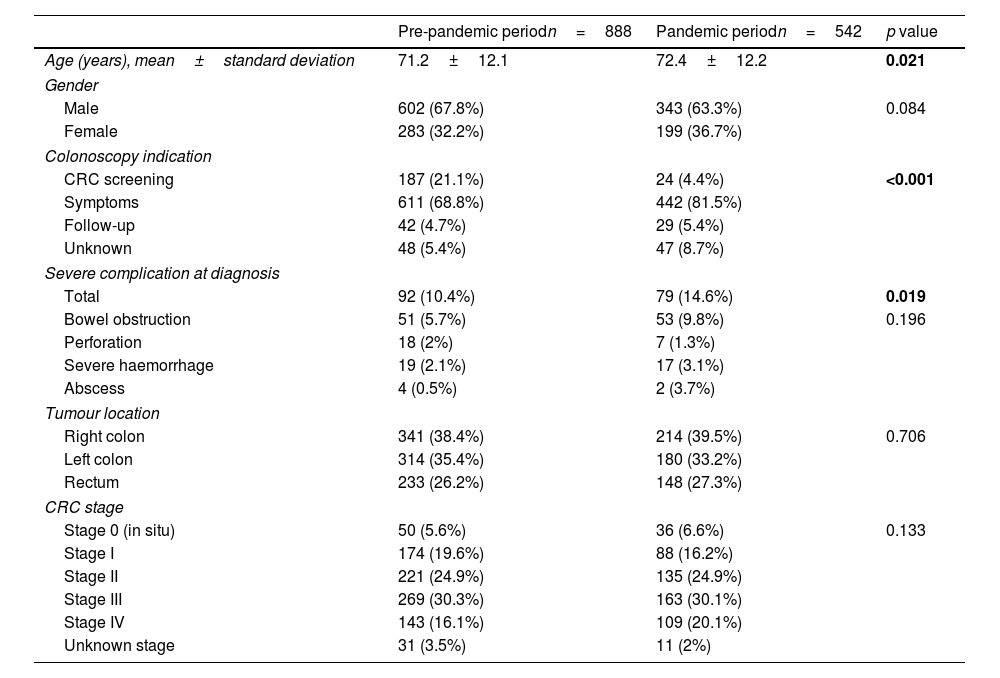The COVID-19 pandemic has been associated with a decrease in the colorectal cancer (CRC) incidence, due to the disruption of screening programmes and a downscaling of endoscopic activity. The endpoint of this study is to evaluate if the pandemic has led to a change in CRC diagnostic rate and presentation in our population.
MethodsMulticenter retrospective study of all public hospitals of the Aragon region, attending a population of 1,329,391 inhabitants. We have analyzed all CRC cases detected and endoscopic units workload the year before the pandemic onset (1 March 2019–14 March 2020) and the first year of the COVID-19 pandemic (15 March 2020–28 February 2021).
ResultsThe diagnosis of CRC cases dropped a 38.9% (888 pre-pandemic vs 542 pandemic cases). Also, there were 30.3% less colonoscopies performed (24,860 vs 17,337). During the pandemic, CRC cases were diagnosed in older patients (72.4±12.2 vs 71.2±12.1 years, p=0.021), and had more frequently severe complications at diagnosis (14.6% vs 10.4%, p=0.019). Moreover, most CRC cases were diagnosed in symptomatic patients (81.4%). No significant difference was found in CRC stage at diagnosis, although stage IV was more frequent (20.1% vs 16.1%). Most hospitals reported a lower workload of endoscopic activity.
ConclusionCRC diagnostic rate was lower after the onset of the pandemic. CRC was diagnosed in older patients and was more frequently associated with complications. After the onset of the pandemic, the endoscopic units did not reach the workload performed previously.
La pandemia del COVID-19 ha provocado una disminución en la incidencia de cáncer colorrectal (CCR) tras la suspensión de los programas de cribado y la reducción de la actividad endoscópica. El objetivo del estudio es evaluar si la pandemia se ha asociado a un cambio en la incidencia y presentación del CCR en nuestra población.
MétodosEstudio multicéntrico, retrospectivo de todos los hospitales públicos de Aragón, con 1.329.391 habitantes. Analizamos todos los CRC detectados y la carga laboral de las unidades de endoscopia del año prepandémico (1 marzo 2019 – 14 marzo 2020) y el primer año de la pandemia (15 marzo 2020 – 28 febrero 2021).
ResultadosEl diagnóstico de CRC descendió un 38,9% (888 casos prepandemia vs. 542 en pandemia). Se realizaron un 30,3% menos de colonoscopias (24.860 vs. 17.337). El CRC en pandemia se diagnosticó en pacientes de mayor edad (72,4±12,2 vs 71,2±12,1 años; p=0,021) y presentaron más complicaciones graves en el momento del diagnóstico (14,6 vs. 10,4%; p=0.019). La mayoría de los CRC se diagnosticaron en pacientes sintomáticos (81,4%). No hubo diferencias en el estadio al diagnóstico aunque el estadio iv fue más frecuente (20,1 vs. 16,1%). La mayoría de los hospitales reiniciaron la actividad endoscópica con una menor carga laboral.
ConclusiónLa tasa diagnóstica de CRC descendió tras el inicio de la pandemia, el CRC fue diagnosticado en pacientes mayores y se asoció con más complicaciones al diagnóstico. Tras el inicio de la pandemia, la mayoría de los hospitales reiniciaron su actividad con una menor carga laboral.











